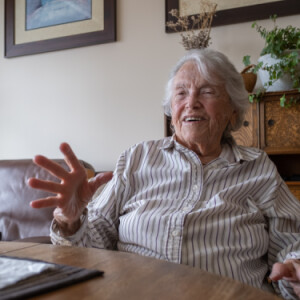New instrument
This photo of Bella is a passage-marker. She can study flute in middle school, and her parents are renting this one for her to learn on. She has learned the fingering, but she hasn’t yet learned how to place her mouth so that she can make a sound with it. That will change, and I look forward to hearing her play. Evan has started piano lessons at a community center and is practicing on a keyboard at home without having to be urged (so far).
This morning Cristina needed to attend an early meeting, so I set my alarm for 6 a.m. and drove out to Beaverton in Sue’s car to take each of the children to their respective school, Evan’s beginning at 8 and Bella’s at 9:15. Then I came back in time to meet Margie for our usual visit. (The 18mm lens is not great for portraits, as WalkingMarj warned. See extra.)
I asked Margie a question left from last week. “Did Uncle Samuel ever thank your father for sacrificing so that Sam could get an education?”
“No, I don’t think he did. I think he believed he did it on his own. In a way he was right about that. He had unusual drive. But I’m not sure; maybe there was some conversation I didn’t hear. I loved my father’s family, the Ludwigs. My father was the eldest, then Sam, Clara, and Herman. I always felt comfortable with them. I could be myself and be loved without being measured. Clara and Herman both married goyim, which was a bit of a shock, but I found it very romantic. ‘They married for love,’ people said, ‘outside of our faith.’ That was odd, because both sides of the family were non-observant. I wasn’t even sure what our ‘faith’ was. We didn’t go to Temple. I don’t even know if there was a Shul. My parents spoke Yiddish at home when they didn’t want us to understand what they were saying, but they never wanted us to learn it. We should blend in. That was the message I got.
“Grandma Ludwig was kindness itself, and I adored her. I remember my father taking me to say goodbye to her. She was dying, lying in her bed, and I must have been four or five. He lifted me over her so I could lean down and kiss her, and she didn’t say anything. I was surprised because she always made so much of me, always gave me wonderful things to eat. My father told me she was sleeping. I felt the hush in the room, the respect, the love. I didn’t understand what death was, and that I wouldn’t see her again. Ever. Sometimes when you’re a child, you realize when something important is going on, and if you don’t get it, you let it go because there are so many things you don’t get about adults.
“My mother always looked down on my father’s family, apart from Uncle Samuel, who she regarded as unlike the rest of them. Why? I guess she thought the rest of them were lower class. They didn’t care about anybody’s status or how much money they had. They weren’t discriminating. My mother thought discrimination was a sign of class and intelligence. She tried to hide the fact that she was Polish and Jewish. She would say, about being Jews, ‘It’s always trouble, being a Jew. Who needs it?’ We always knew we were Jews, we never denied it, and we had a certain quiet pride about belonging to that group. But we knew that away from the Bronx, everyone would look down on us if they knew, so my mother taught us to keep it under wraps.”


Comments
Sign in or get an account to comment.


